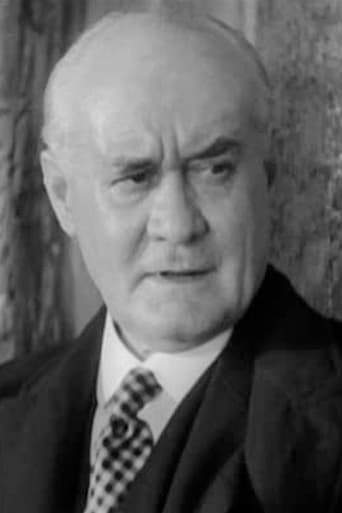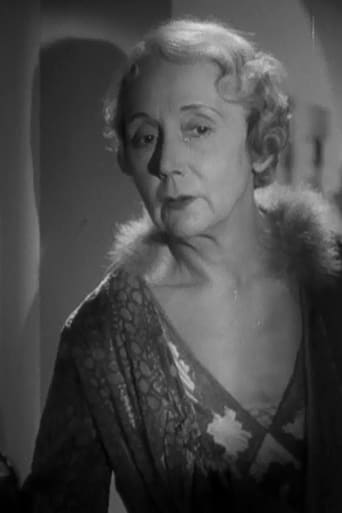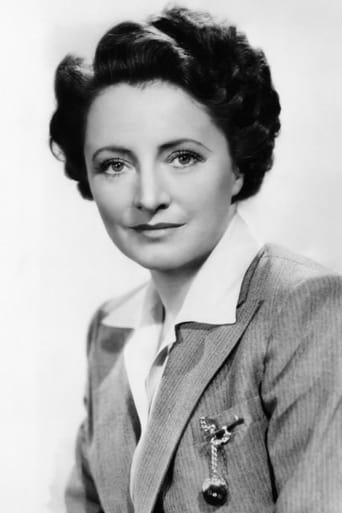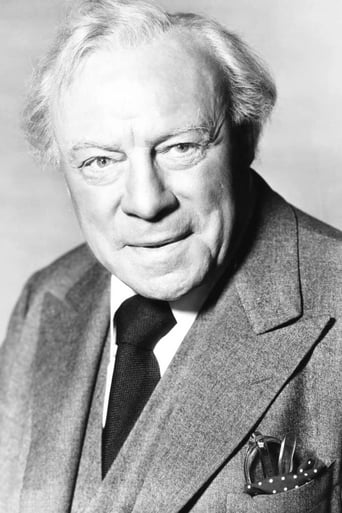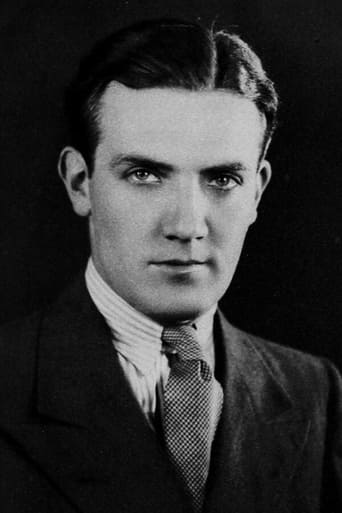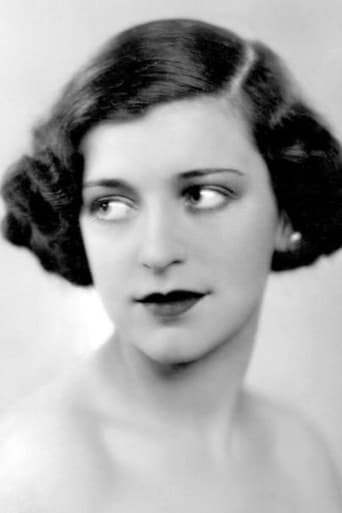Ghoulumbe
Better than most people think
Comwayon
A Disappointing Continuation
ChicRawIdol
A brilliant film that helped define a genre
Billy Ollie
Through painfully honest and emotional moments, the movie becomes irresistibly relatable
utgard14
Early Alfred Hitchcock film about a feud between two wealthy neighbors, one from old money and one from new. Not among Hitchcock's best, even limited to this decade. It's a talky, somewhat stagy affair with unlikable characters and a lack of a clear point. Edmund Gwenn is fun to watch at times, and the cast on the whole is good, but the script is dull and the direction surprisingly lifeless. Even good actors can't save it. Worth a look for Hitchcock fans but keep expectations low.
jacobs-greenwood
Directed by Alfred Hitchcock, who along with his wife Alma Reville adapted the John Galsworthy play, the film's title (in lieu of its more modern definition) refers to something akin to "an eye for an eye" where everyone turns out blind in the end. In other words, no one has "clean hands", in the final accounting of this kind of grudge match.This average drama is not as bad as I was led to believe, and actually contains quite a good, early talkie performance by Edmund Gwenn, playing a character much different from the more gentle roles he would take later in his career. The titled "game" is between industrialist Hornblower (Gwenn), who wants to build factories on what has always been beautiful rolling hills in the name(s) of progress and profit, and the Hillcrist family, who owns (and has always owned) a country home in this idyllic setting. The film's sound quality, so poor during the auction sequence that one can't hear the reading of the land's particulars, improves as the story progresses.Squire (C.V. France) and Mrs. Hillcrist (Helen Haye) are informed by an old farmer (Herbert Ross) and his wife (Dora Gregory), the Jackmans, who have worked the land they've just sold for 30 years, that the new owner, Mr. Hornblower, is planning to build a factory complete with smokestacks on the property. The Hillcrists had a verbal agreement with Hornblower not to evict the Jackmans, but Hornblower explains that he hasn't been able to buy the land he'd intended, so he really has no choice. Gwenn delivers quite a capitalistic monologue, perhaps the film's best scene, as he alternately oozes charm and rigidity. The thought of a factory being built so close to their country home so horrifies the Hillcrists that they employ their lawyer Dawker (Edward Chapman) to find a way out.After unsuccessfully outbidding Hornblower at a land auction (Ronald Frankau plays the auctioneer), during which they'd shunned his daughter-in-law Chloe (Phyllis Konstam) out of spite, the Hillcrists learn from Dawker that Chloe has a sordid past. Konstam, foreshadowing Hitchcock's later use of sexy women, looks stunning; the director utilizing shadows to emphasize her (near hyperventilating) swelling breast. Mrs. Hillcrist is willing to exploit Chloe's past, while the Squire remains uninvolved, insisting their daughter Jill (Jill Esmond), who'd been "flirting" with the youngest Hornblower, Rolf (Frank Lawton), remain "in the dark".Chloe had been a correspondent, something of which her husband Charles (John Longden), Hornblower's eldest son and business partner, was unaware. Dawker uses another man (R.E. Jeffrey, in a leather coat), who'd been at the auction, to set Chloe on edge. When Hornblower finds out about his daughter-in-law's past, he's forced by Dawker and Mrs. Hillcrist to sell back the auction land at a huge loss (5,000 pounds). Dawker had utilized both the man in the leather coat and one of her past clients (George Bancroft) to make Chloe admit her scandalous past. Hornblower makes Dawker and Mrs. Hillcrist hold a bible while swearing to keep quiet about what they know regarding Chloe.The unscrupulous Dawker is unable to keep the secret from Charles, who was curious as to why his father no longer owned title to the auction land. He pursues her to the Hillcrist's home where she commits suicide upon hearing, from behind a curtain, of her husband's loss of any love for her (he'd learned the truth). After helping Rolf fish Chloe's body out of the Hillcrist's swimming pool, Hornblower admits to the Squire that he is beaten. The Squire laments the nature of a "skin game".
Robert J. Maxwell
This early film, part of the Signature Collection, by Hitchcock -- "A Talking Picture" -- is marred by a poor transfer or, more likely, poor recording in the first place. Sometimes the dialog is obscured by a buzz. It was tough making a talking picture in 1931 in Britain. The camera was the size of a dirigible and the microphones were hidden in tea pots. These and other conditions rather hobbled the director.That being understood, this still is by no means an outstanding movie. If it strives for Shakespearian impact, it winds up with the Hatfield and McCoys.Two families feud over a large plot of empty land. The Hillcrests are upper class. They've owned one of those country estates since Elizabeth I. The Hornblowers, especially the patriarch, Edmund Gwenn, are ambitious and working-class. Gwen meets the Hillcrests and offers to buy them out. After all, his mills surround their place. Of course they won't sell because they treasure their peace and quiet. The frustrated Gwenn storms out, warning, "I mean business." The quarrel then takes the shape of a conflict over that large empty plot, and there is a tense and pertinent scene of bidding and counter-bidding at its auction. It winds up in the hands of the Hornblowers by means of a subterfuge. Oh -- the Hillcrests always refer to Horblower as "Hawn-blah." I forgive them for that. If British accents sound a little strange to American ears, well, it's all Noah Webster's fault.Ticked off at the fact that they will now likely be surrounded entirely by Hornblower and his Satanic mills, the Hillcrests dig up some dirt on his daughter-in-law which leads to her tragic death.The ending: The Hillcrests are filled with sadness and guilt. Hornblower is their Nemesis, clearing that empty plot of its trees and, presumably, putting up the world's most foul dung heap of a mill.The conflict is established in the first scene when a Hillcrest daughter (on horseback) meets a young Hornblower man (in an automobile). They describe to each other what they're looking for in the future. Hillcrest says, "We call it spoiling," and Hornblower replies, "We call it progress." When I was a kid I'd have sided with the Hornblowers. Now I'm not at all sure. This particular area of England seems headed towards the Welsh countryside of "How Green Was My Valley." The acting of the principles is outrageously florid, as if they were still trying to reach the balconies. Phyllis Konstam, in particular, postures and sweeps around, her voice quivering in that stagy way that John Gielgud sometimes adopted. The pauses between utterances sometimes are longer than they need to be and it slows down the pace of the movie.It's a rather bland B movie in almost every way and Hitchcock only twice experiments with visual effects and montage, one during a dizzy spell and the other showing us the noise and squalor of the mill town using bawling sheep, barking dogs, haggling men, and noisy truck horns.Not worth going out of your way to watch, but still not entirely without at least historical interest, if not artistic.
Bill Slocum
One of Alfred Hitchcock's atypical non-murder films comes with some suspense and a nice take on the issue of class which marked the world he came from, courtesy of a John Galsworthy play. But its soapy leanings cost it the ground gained by a strong start.Rural England is changing into something unrecognizable to the snobby highborn Hillcrist family whose own estate is threatened by the impish pottery tycoon Hornblower (Edmund Gwenn). His low tactics in securing a neighboring property for a factory bring out the Lady MacBeth in Mrs. Hillcrist (Helen Haye), who with the help of her amoral gopher Dawker (Edmund Chapman) uncovers a nasty secret regarding Hornblower's daughter-in-law Chloe (Phyllis Konstam) which could cost him all his ill-gotten gains."The Skin Game" starts out strong, with Gwenn striding into the Hillcrist manor like a conquering hero, a dynamo in a bowler hat, giving them whatfor in such a way as to earn us both our respect and our active dislike. He's impossibly smug, like New England Patriots coach Bill Belichick after running up the score on another overmatched opponent. Yet he's in charge all the same."I fancy there's not enough room for the two of us here," he tells the Hillcrists, after breaking his word by evicting an elderly couple whose property Mr. Hillcrist sold him under the condition he leave the couple alone. "You've had your own way much too long. And you're not going to any longer."The action heats up at an auction which is the film's one sterling set piece, Hitchcock's camera rearing back and forth between Hornblower and Dawker like a spectator at a Wimbledon match. Ronald Frankau as the auctioneer is one of those one-scene performances in a Hitchcock film you remember long after forgetting most everything else, blowing his nose and guying up the price so amiably as to undercut the building tension. Mr. Hillcrist finally jumps in as the price goes ever higher, only to discover he's not only failed to foil Hornblower but earned the blaggart's redoubled enmity.But things fall apart after, as the story of Chloe takes center stage. Konstam is way too hysterical, her trebly voice making even more shrill lines such as "What gets in the wind never gets out...Never...Just blows...And then blows home!" By the time we get to the sad resolution, the once-involving tale is drowning in melodrama and bad acting. Even Gwenn is reduced to a kind of Nosferatu, eyes shifting and hands wringing.There's a nice through-line regarding how the game of social advancement was played in early 20th century England. The Hillcrists start out fairly decently, but wind up rather dastardly. Yet however awfully Mrs. Hillcrist plays her whiphand in this affair (and Haye, like Gwenn reprising her role from a 1921 silent, is the class of the cast), you realize she had to be ruthless in order to win, and there's some ambiguity at the end as to whether it was worth it.But that's Galsworthy's contribution. Hitchcock was not in his element here, and it shows. "The Skin Game" is another of those early curiosities of the Master seeking his voice but not quite finding it.
